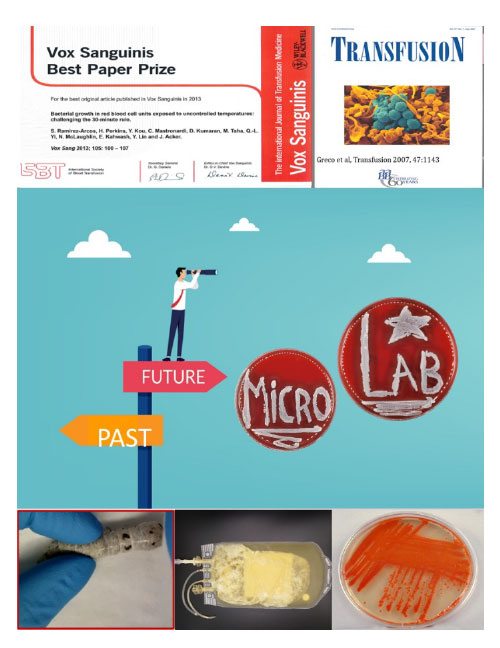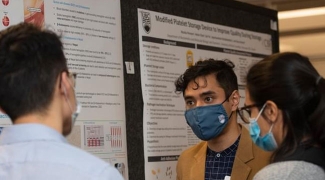Microbiology lab reflects on 20 years of advancing knowledge and providing evidence to improve blood component safety
Tuesday, February 13, 2024 Sandra Ramirez-Arcos
This post was written by Canadian Blood Services senior scientist, Dr. Sandra Ramirez-Arcos, on behalf of the microbiology lab, affectionately known as the Micro Lab, located at Canadian Blood Services’ head office in Ottawa. Current members of the Micro Lab include senior development assistants Yuntong Kou and Dilini Kumaran (who is also a PhD candidate), development assistant Adriana Zapata, post-doctoral fellow Sylvia Ighem-Chi, and PhD candidate Carina Paredes.
Although a rare occurrence, bacterial contamination of blood components continues to be a significant post-transfusion infectious risk. Donated platelets are particularly susceptible to bacterial proliferation because they are stored in a nutrient-rich environment at ambient temperatures. The main types of bacteria present in platelet concentrates are typically found on human skin and are likely introduced at the time of blood collection. Studies conducted by project leads, development assistants, undergraduate and graduate students, and post-doctoral fellows under the supervision of Dr. Ramirez-Arcos, have advanced knowledge by providing evidence-based data to improve processes and products at Canadian Blood Services and enhance safety for transfusion recipients. Over the last 20 years, the group has pioneered work on the dynamics of bacterial growth during blood component storage and generated more than 85 peer-reviewed publications.
Changing the paradigm of skin flora bacteria as harmless organisms
In 2007, Dr. Ramirez-Arcos’ group was the first to discover that bacteria found on the skin, like Staphylococcus epidermidis, create communities of cells stuck to surfaces, known as biofilms, when platelet concentrates are stored. This groundbreaking discovery paved the way for more successful research looking at biofilm formation by other skin bacteria like Cutibacterium acnes and harmful organisms relevant to transfusions such as Staphylococcus aureus and Serratia marcescens.
Recent studies have uncovered new information about how bacteria change at a molecular level when they grow in platelet concentrates. These changes lead to increased production of toxins, resistance to antimicrobial peptides and antibiotics, and higher secretion of inflammation-triggering molecules during platelet storage. These findings could have important implications for patients receiving transfusions. Our research also focuses on understanding why some bacteria can withstand donor skin disinfection and avoid detection, and exploring alternative methods to improve current processes.

Inserts illustrate 1) a silkworm, optimized by the PhD candidate Dilini Kumaran, which is used as an animal model to study bacterial virulence; 2) a platelet unit contaminated with bacteria that form aggregates; and, 3) a culture of the bloodborne bacterium Serratia marcescens.
Figure prepared by PhD candidate Carina Paredes, Sr. Development Assistant Yuntong Kou, and Sr. Scientist Sandra Ramirez-Arcos.
Making a difference at national and international levels
The microbiology lab has led several activities supporting changes at Canadian Blood Services and abroad. Some of these activities include (a) providing evidence to change blood donor skin disinfection protocols and implement processes such as platelet screening for bacterial contamination, (b) implementation of sterility testing of blood components and cord and stem cell products, and (c) support the extension of the shelf-life of platelet components.
Our studies have also supported the implementation of new products such as cold-stored platelet concentrates, whole blood, and platelet concentrates suspended in a mix of plasma and platelet additive solution. Research and development studies of major impact include the change of the 30-minute rule for red blood cells and plasma to a 60-minute rule, a welcome change by blood suppliers and hospitals to increase efficiency of product utilization without compromising patient safety. This work received recognition by the International Society of Blood Transfusion (ISBT) with the Best Paper Prize of Vox Sanguinis in 2013.
Beyond science: mentorship and leadership
Graduate students and post-doctoral fellows of the lab are actively involved in knowledge translation activities at Canadian Blood Services. Some of these activities include leading scientists’ seminars, presenting in meetings and conferences, and mentoring undergraduate students. Assistants in the lab have also played a key role in the development and implementation of biosafety measures at head office in Ottawa and other Canadian Blood Services sites.
As one of the co-chairs of the ISBT Transfusion-Transmitted Infectious Diseases Working Party Bacterial Subgroup, Dr. Ramirez-Arcos coordinates multinational studies aimed at enhancing blood component safety and knowledge translation. By conducting international surveys and acting as guest editor of special issues in peer-reviewed journals, work from groups around the world get published in focused niches for the transfusion medicine community. One of the current initiatives of this subgroup is to address residual safety risk in the era of advanced screening systems and pathogen reduction, such as detection of bacterial toxins during blood component storage.
Looking into the future
With global warming being a reality that has demonstrated migration of emergent pathogens, the microbiology lab will challenge itself by exploring a new field and expand its research and development scope to include studies with tick-borne bacteria such as Erlichia chaffeensis and Anaplasma phagocytophilum, which can be transmitted by blood transfusion. This initiative will allow us to prepare for the future and complement work of the epidemiology and medical microbiology teams who will be working on the surveillance of these and other tickborne pathogens.
Who is responsible for our success?
This blog celebrates the 20th anniversary of the microbiology lab recognizing invaluable contributions of past and present project leads, post-doctoral fellows, graduate, and undergraduate students. Our successes are only possible due to effective networking and collaboration with other groups within Medical Affairs & Innovation and beyond. Contributions of the microbiology lab would not be possible without the generous gift of volunteer donors and production of blood components for research at the Blood4Research Facility in Vancouver.
Canadian Blood Services – Driving world-class innovation
Through discovery, development and applied research, Canadian Blood Services drives world-class innovation in blood transfusion, cellular therapy and transplantation—bringing clarity and insight to an increasingly complex healthcare future. Our dedicated research team and extended network of partners engage in exploratory and applied research to create new knowledge, inform and enhance best practices, contribute to the development of new services and technologies, and build capacity through training and collaboration. Find out more about our research impact.
The opinions reflected in this post are those of the author and do not necessarily reflect the opinions of Canadian Blood Services nor do they reflect the views of Health Canada or any other funding agency.
Related blog posts
For the second year, the International Society of Blood Transfusion (ISBT) offered their annual congress online. In June 2021, the virtual “ISBT In Focus” explored the latest in transfusion medicine and science, immunohematology and cellular therapies. In today’s blog, two Canadian Blood Services’ delegates describe their experiences at the congress.
The 11th annual Centre for Blood Research Norman Bethune Symposium was held on April 6, 2022. With a focus on recent research advances in bleeding and thrombosis, the symposium engages scientists and clinicians at all levels of training.
Several competitive training and funding programs to support graduate fellowships and educational and research projects are open for applications until November 15! Read on to learn more about these opportunities and hear about past recipients.

